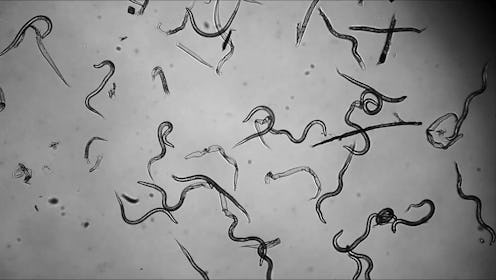If you have a phobia of anything that's creepy crawly, you might want to stop reading now. A worm so heinous that it's been dubbed the 'American Murderer" is invading people's bodies and tricking their immune systems. This killer worm sheds its skin to hide inside of your body, according to a new study of the Necator Americanus, or American Murder, published in the journal PLOS Neglected Tropical Diseases. If you regularly go barefoot, and you live in a tropical or sub-tropical climate (like the southern U.S.), the American Murder could decide that your body is a worthy place to set up house.
This little bugger is extremely crafty, which means that once it enters uninvited through the foot and rents a space in your intestines, it can go undetected for up to 15 years, according to Live Science. The American Murder succeeds so well at flying under the radar because when the worm sheds its skin it releases a chemical that acts as a decoy to the immune system, essentially confusing it so it can party inside your body like a hitman waiting for just the right moment. Grossed out yet? If you watched that recent Grey's Anatomy episode where a woman was literally being devoured by intestinal worms, then you might be appropriately freaked.
The good news is that you probably aren't infected, however the long absence of symptoms is troubling, meaning that if you do have a worm, you might not know for years.
"The hookworm life-cycle is very successful with an estimated 576–700 million people infected worldwide," the study, conducted by Dr. Veeren Chauhan and Professor David Pritchard at the University of Nottingham's, School of Pharmacy, noted. "Individuals with a light hookworm burden are usually asymptomatic, while hosts with a heavy hookworm burden present with symptoms of ‘hookworm disease,’ which include anaemia, fever, diarrhea, nausea, vomiting, rashes, abdominal pain, and intestinal cramps."
If you're feeling all itchy and scratchy right now, you're not alone. Scientists also want to stop the American Murder from wreaking havoc on human bodies. With this in mind they committed to learning more about what happens when it first enters the body.
"With a detailed understanding of its fingerprint at this point, we can think of treatments to stop the parasite in its tracks before it gets to the lungs and gut, where it causes damage to the body," Professor Pritchard said in a press release about the study. Stopping these undercover worms in their early stages is key to preventing them from having a party like this in your gut.
Now for the good news. The worm study has paved the way for future studies that will hopefully allow researchers to find a way to get rid of this creepy crawly killer all together. "Directly observing the physical and chemical properties of this globally important pathogen in this amount of detail is extremely significant and paves the way for an in-depth biological study to develop early interception methods, such as vaccines, not only for Necator Americanus but for other infective organisms," Dr. Chauhan noted in the press release.
Historically, the hookworms infected people living in the southern U.S., according to NOVA on PBS. Because doctors could not identify a cause for sufferers' symptoms before the effects of the worms were widely known, they were deemed lazy due to their sapped energy. Scientists now know that this is a side effect of being infected by hookworms. "Hookworms stymied development throughout the region and bred stereotypes about lazy, moronic Southerners," Rachel Nuwer reported for NOVA.
While hookworms were thought to have been eradicated decades ago, a new study has found that they are still alive and well in some parts of the U.S., according to NPR. Places with poor sanitation, or that have suffered disasters that compromise sewage systems, can be attractive places for hookworms. More good news: if you do get infected, the worms don't actually reproduce inside of you, Dr. David Diemert, a hookworm expert at George Washington University, told NPR. You actually have to contract another one to get a second worm, which in the U.S. is unlikely.
Common sense is the best defense against this killer worm. Keep your shoes on in developing countries, and in places recently ravaged by disasters. The bottom line is that you're probably not going to get infected by an American Murder, but it's still pretty terrifying.
